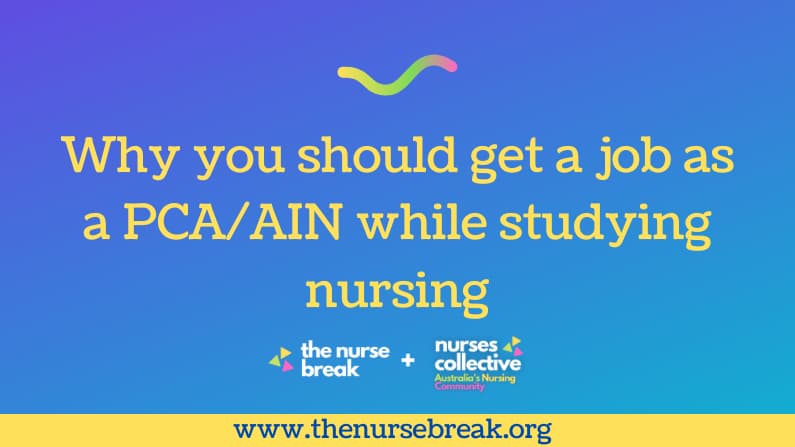Table of Contents
Why not try one of these jobs for nursing students?
What is a PCA/AIN
If you want to gain practical hands-on experience, and begin to work in the healthcare industry, you can while studying nursing or paramedicine and get exposure to the core of patient care.
An AIN is an Assistant in Nursing (AIN) and a PCA is a personal care assistant or patient care assistant. These terms and acronyms differ in meaning between agencies and health services.
AIN/PCA’s can work in most healthcare settings including aged care facilities, private care in the community, and hospitals.
Varied Role
The role normally involves assisting patients and residents with activities of daily living (washing, feeding, toileting, hygiene, dressing). In hospitals, there are also many shifts available given to PCA/AIN’s for ‘SPECIAL’ or ‘CLOSE OBSERVATION’ shifts which involves being allocated to look after between normally 1 – 3 patients in a ward or in ICU or ED who are either agitated, confused, impulsive, dementia patients, those who are wandering or risk of absconding – to help relieve pressure on the already busy nurses.
Disability/home care/community care shifts can involve
Meal preparation, shopping with the client, cleaning, personal hygiene, and escorts between facilities. It does involve a lot more than what was just mentioned but they are some main ones.
It depends on clients as well. You might meet some clients who just want to have a chat and require very little work, while others require almost full nursing care. It is great as you meet so many different people and can build wonderful therapeutic relationships with them because you can be working with a client on a regular basis and in their own home. You will also have to drive between different clients home, you do normally get paid for the travel.
Exposure
These shifts are great experiences while studying nursing because you get to be exposed to the health service and it’s culture, interacting with nurses and doctors and other staff, can learn about the patients medical condition, practice patient communication and de-escalation and demonstrates a drive to continually want to learn new things.
Extra $$
You’re most liekly going to be doing this job on a casual wage so ideally you’ll get 25% casual loading on top of base wage, to cover the lack of sick and annual leave. This can mean big $ especially on weekends that can be in excess of $40/hr.
Qualification?
There seems to be different entry requirements depending on place of employment. Some places accept 2nd and 3rd year nursing students while others require you to complete the appropriate certificate. We recommend you contact employers and ask what’s required.
Certificate III in Health Services Assistance (HLT33115) or a Certificate IV in Allied Health Assistance (HLT40315). But there are also heaps of other courses that might be accepted, check with the provider/employer. Ie: Aged Care and Individual Support courses.
Getting a job
- Contact hospitals directly, care and support agencies and aged care facilities and try join their casual ‘bank’.
- Some agencies/companies that are based in Victoria (and some are interstate) that hire support staff/PCA/AIN’s: Your Nursing Agency (YNA), Belmore, Caring for You (C4U), Medical Staff, Health Care Australia (HCA), Victorian Nursing Service (VNS), First Call, Programmed Health Professionals, Alpha Nursing, Bolton Clarke, AQA Qualcare, Scope, Aktrapid Nursing
- As a student some places where you do your clinical placement may even take you on. If you have performed well, try speak in person to the nursing coordinator and/or NUM about potential jobs.
Stay tuned for a blog post on interview tips for PCA/AIN’s and how to ace your interview.
Short list of skills you could gain by being a PCA/AIN for your resume and cover letter
For Resume and Cover letter help: Click Here
- Dealing with death and dying
- Learning about patient/family interactions
- Practising mobility of patient skills
- Offering emotional support
- Learning about disease processes and comorbidities
- Personal care
- Adapting to different staff dynamics
- Adapting to different environments, policies and procedures
- Learn from poor practices you see
- Being involved in emergency calls and being exposed to deteriorating patients





